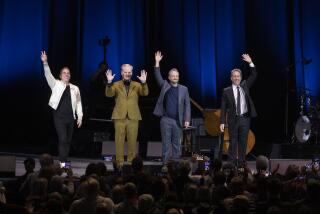‘BEYOND THE FRINGE’-- A HUMOR TIME CAPSULE
- Share via
Age-old question: Does British humor travel well? If so, how far? In time? In distance?
“Beyond the Fringe,” which saw the light of day 25 years ago as a raffish bit of British satirical lunacy by four exceptional young men--Allan Bennett, Peter Cook, Jonathan Miller and Dudley Moore--was a huge success in its day.
It was one of those happy confluences of talent, temperament and moment: The coming together of the right people at the right time in the right stuff at the right place.
“Fringe” traveled to Broadway with its original cast, experiencing not a whit of trouble in the transplant. But over the years, with other performers in different social contexts, this four-man satirical revue has fared less well.
The 25th anniversary edition that opened at the Los Angeles Theatre Center on Tuesday has several things going for it. It traveled only a short geographic distance--up from San Diego, where it was a major hit at the Old Globe this summer. It is directed by and features Paxton Whitehead, who replaced Miller in the original Broadway run. It also features the sizable talents of Tom Lacy, Jim Piddock and Jerry Pavlon. But it does not escape the ravages of time.
The damage is all very subtle. It has, yes, something to do with the idiosyncratically British rhythms of the humor (more fragmented and deadpan than ours), but it has more to do with the creakiness of jokes about Harold Macmillan and Khrushchev and British dons arguing how -are-you vs. why -are-you.
Yet even when we get into such neutral territory as “The Death of Nelson,” or Vicar Dick’s attempts to win over the younger generation or the mildly unpleasant Tarzan audition of “One Leg Too Few,” the comedy remains a half-beat off. The jokes are unmistakably there, but a lot of what made them funny then only makes them forced now. It’s a little like casually browsing through an old issue of “Punch” and appreciating the wit with a certain reverential detachment.
Whitehead’s staging encourages that. He makes no attempt to update or Americanize or otherwise tamper with the original, but gives us “Fringe” intact--a humor time capsule, with the strains of “We’ll meet again/Don’t know where/Don’t know when” languidly bridging scenes and fueling nostalgia. (Do my ears deceive me or is that really the voice of Vera Lynn?) “Fringe” simply isn’t at ease in 1986--or wasn’t Tuesday--as though aware of its intrusion into another psychology.
Whitehead, Piddock and Pavlon have all cultivated punctilious degrees of British efficacy and cool, and even Lacy, easily the broadest clown in the Old Globe’s eyrie of associate artists, is disappointingly restrained here.
Yet, for all the denting and pitting, “Fringe” retains moments of solid gold--the most notable being Piddock’s monologue as the coal miner inspired to write a book about his incredibly boring life.
Other jabs--at Scotland Yard (timeless), at America (the advice on visiting the U.S. that opens the second half), at Brecht/Weill songs (with Pavlon at the piano)--are more brass than gold.
“Fringe’s” anti-war clamor doesn’t go much beyond the sterling level of “I want you to lay down your life; we need a futile gesture at this point.” And with such skilled Shakespearean actors on board, the death-of-kings spoof at the end--something that has the potential, on a smaller scale, of the “Romeo and Juliet” melee in “Nicholas Nickleby”--remains curiously underdeveloped.
In this age of Monty Python and equally savaging satire (bouncing off a world offended by daily violence), “Fringe” comes across as remarkably benign. It is a faintly outmoded, surprisingly gentle classic that makes us chuckle, but has lost its teeth. We admire what it once was more than we appreciate what it now is, though a revue that tells you “life is like opening a sardine can without being able to find the key” fairly reeks of its own aristocratic comic pedigree.
Performances in Theatre 2 at 514 S. Spring St. run Tuesdays through Sundays, 8 p.m., with matinees Saturdays and Sundays at 2 p.m. through the holidays. Tickets are $10 to $22 (213) 627-5599.
More to Read
The biggest entertainment stories
Get our big stories about Hollywood, film, television, music, arts, culture and more right in your inbox as soon as they publish.
You may occasionally receive promotional content from the Los Angeles Times.










